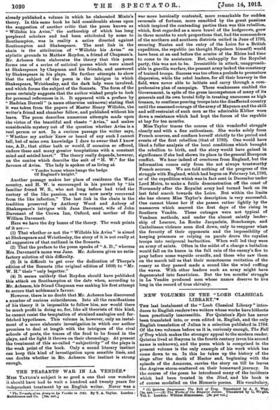THE PEASANTS' WAR IN LA VENDEE.* Miss TAYLOP.'s subject is
so good a one that one wonders it should have had to wait a hundred and twenty years for independent treatment by an English writer. Never was a
• The Tragedy of an Army in La Ven(l2e in 1793. By T. A.. Taylor. London : Hutchinson and Co. [16s. net.] war more heroically contested, more remarkable for sudden reversals of fortune, more ennobled by the great passions which inspired the contending parties than was this rebellion, which, first regarded as a mere brawl of the hedgerow's, grew in three months to such proportions that, bad the commanders of the northern and southern districts united in June of 1793, securing Nantes and the entry of the Loire for a British expedition, the republic (so thought Napoleon himself) would have been at an end before the armies of the Rhine had time to come to its assistance. But, unhappily for the Royalist party, this was not to be. Irresistible in attack, unapproachr able in guerilla warfare, the peasant army lacked the constancy of trained troops. Success was too often a prelude to premature dispersion, while the rebel leaders, for all their bravery in the field, were never able to initiate and carry through a com- prehensive plan of campaign. These weaknesses enabled the Government, in spite of the gross incompetence of many of its generals and its own brutal folly in treating unsuccess as high treason, to continue pouring troops into the disaffected country until the seasoned courage of the army of Mayence and the skill and self-restraint of such men as the admirable Kleber wore down a resistance which had kept the forces of the republic at bay for ten months.
Miss Taylor traces the course of this wonderful struggle clearly and with a fine enthusiasm. She works solely from French sources, and confines herself strictly to the period and events of the first rebellion (that of 1793). One would have liked a fuller analysis of the local conditions which brought the rebellion to birth, and the story would have gained in significance if she had shown its place in the general European conflict. We hear indeed of overtures from England, but the information comes only from the not always trustworthy French sources. We are told nothing of the progress of the struggle with England, which had begun on February lst,1793, or of the expedition which was in fact sent in December under Lord Moira, to make a futile demonstration off the coast of Normandy after the Royalist army had turned back on its last fatal march towards the Loire. But within the limits she has chosen Miss Taylor's description is very successful. One cannot blame her if she passes rather lightly by the massacres which marred the first days of the rising in Southern Vendee. These outrages were not typical of Vendean methods, and under the almost saintly leader- ship of Lescure, La Roche Jacquelein, Bonchamps, and Cathelineau violence soon died down, only to reappear when the ferocity of their opponents and the impossibility of keeping prisoners or relying on parole drove the royalist troops into reciprocal barbarities. When well led they were an army of saints. Often in the midst of a charge a battalion would fall on its knees in the full rain of the enemy's fire to pray before some wayside crucifik, and those who saw them on the march tell us that their monotonous recitation of the rosary as they passed made a sound like the wind ruffling the waves. With other leaders such an army might have degenerated into fanaticism. But the ten months' struggle in La Vendee produced men whose names deserve to live long in the record of true chivalry.














































 Previous page
Previous page